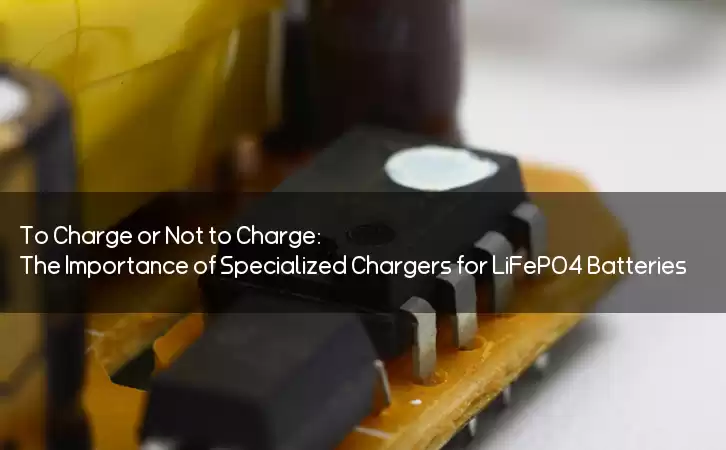Information Center
To Charge or Not to Charge: The Importance of Specialized Chargers for LiFePO4 Batteries
Published:2023-07-24 10:37:32 Author:Green WCND Views:51As the market for lithium iron phosphate (LiFePO4) batteries continues to grow, many people are wondering if these batteries require a special charger. The short answer is yes, LiFePO4 batteries do need a specialized charger, but there are a few important factors to consider in the decision of which charger to choose.

First, it’s important to understand what sets LiFePO4 batteries apart from other types of lithium-ion batteries. One of the main benefits of LiFePO4 batteries is their stability and safety. Unlike other types of lithium-ion batteries, LiFePO4 batteries are highly resistant to thermal runaway -- a dangerous condition where the battery becomes overheated and potentially explodes. This makes LiFePO4 batteries an excellent choice for high-performance applications such as electric vehicles, renewable energy storage, and marine applications.

However, this safety and stability comes at a cost. LiFePO4 batteries have a lower energy density than other types of lithium-ion batteries, which means they can’t store as much energy in the same amount of space. As a result, it’s important to maximize the charging efficiency of LiFePO4 batteries to ensure that they are fully charged and ready to go when you need them.
So what makes a charger suitable for LiFePO4 batteries? The first factor to consider is the charging voltage. LiFePO4 batteries typically have a nominal voltage of 3.2 or 3.3 volts per cell, which is lower than other types of lithium-ion batteries. Therefore, chargers designed for LiFePO4 batteries must have a maximum charging voltage of around 3.6 volts per cell. Using a charger with a higher voltage can damage the battery, reduce its lifespan, and even cause it to catch fire.
The second factor to consider is the charging current. LiFePO4 batteries require a specific charging current to get the most out of them. This current is typically around 0.5 to 1C, where C is the rated capacity of the battery in amp-hours. For example, a 200Ah LiFePO4 battery would require a charging current of 100 to 200 amps. Using a charger with a lower current will result in slower charging times, while using a charger with a higher current could damage the battery.
Finally, it’s important to choose a charger that has a built-in charging algorithm designed specifically for LiFePO4 batteries. These algorithms ensure that the battery is charged to its full capacity without overcharging or overheating, which can reduce its lifespan. Some chargers also include safety features such as overcurrent protection, overvoltage protection, and reverse polarity protection.
In conclusion, LiFePO4 batteries do require a specialized charger that is designed to meet their specific charging requirements. These chargers must have a maximum charging voltage of around 3.6 volts per cell, a suitable charging current, and a built-in charging algorithm designed specifically for LiFePO4 batteries. Using the wrong charger can damage the battery, reduce its lifespan, and even cause it to catch fire. By choosing the right charger, you can ensure that your LiFePO4 battery is fully charged and ready to go when you need it, while also maintaining its safety and longevity.
For golf course managers, ensuring smooth and efficient operations is crucial for providing a memorable experience for golfers and maintaining the reputation of···
A battery tester ensures golf course cart batteries operate efficiently and reduces downtime through the following ways:I. Precise Battery Condition DiagnosisOp···
Battery testers significantly enhance the work efficiency of automotive maintenance technicians through several key ways:I. Rapid Diagnosis of Battery IssuesBat···
Battery testers play a crucial role in automotive battery production lines, significantly enhancing efficiency through highly automated testing processes and mu···





